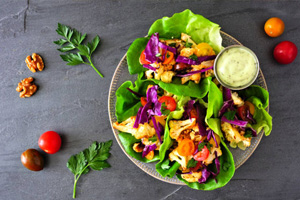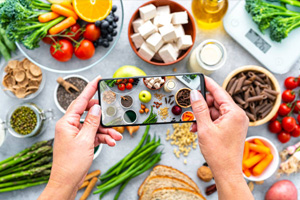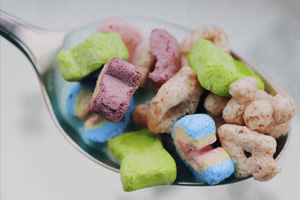Are there diet tips for maintaining healthy skin?
Discover the power of diet in achieving and maintaining healthy, radiant skin Explore essential diet tips, nutrients, and foods for glowing skin in this comprehensive guide Start your journey to beautiful and healthy skin today!
Absolutely! Your diet plays a significant role in the health and appearance of your skin. Maintaining healthy skin is not just about topical treatments; it starts from within. By making the right dietary choices, you can nourish your skin, promote its vitality, and achieve a radiant complexion. In this article, we will explore the diet tips and strategies that can help you attain and sustain healthy, glowing skin. From the nutrients your skin craves to the foods you should include and avoid, we'll delve into the essential aspects of skin-friendly nutrition. Whether you're concerned about dryness, aging, or common skin issues, understanding the relationship between your diet and skin health is the first step towards your goal of having beautiful and healthy skin. Let's embark on this journey to discover the secrets of a skin-friendly diet.

Diet Tips for Maintaining Healthy Skin
1. Embrace a Balanced Diet
A balanced diet is the cornerstone of healthy skin. Ensure you include a variety of foods from all food groups in your daily meals. Fruits, vegetables, lean proteins, whole grains, and healthy fats provide essential nutrients that support skin health. This diversity ensures that your skin receives the vitamins, minerals, antioxidants, and fatty acids it needs for a radiant complexion.
2. Prioritize Hydration
Proper hydration is key to maintaining healthy skin. When your body is well-hydrated, your skin is less prone to dryness and irritation. Aim to drink an adequate amount of water daily, but also consider foods with high water content, such as watermelon, cucumber, and oranges, to supplement your hydration. This dual approach helps keep your skin moisturized and glowing.
3. Harness the Power of Antioxidants
Antioxidants are your skin's best friend. Found in foods like berries, spinach, and dark chocolate, these compounds protect your skin from free radical damage. Free radicals can lead to premature aging and various skin issues. Including antioxidant-rich foods in your diet helps neutralize these harmful molecules, ensuring your skin stays youthful and resilient.
4. Embrace Healthy Fats
Fatty acids, particularly Omega-3 and Omega-6, play a crucial role in maintaining skin moisture. Fatty fish like salmon, walnuts, and flaxseeds are excellent sources of these essential fats. They help form a protective barrier in your skin, preventing moisture loss and protecting it from external irritants. Including these foods in your diet can leave your skin feeling supple and free from dryness or irritation.
5. Invest in Skin-Friendly Vitamins
Several vitamins are essential for skin health. Vitamin A supports skin cell production and regeneration. Vitamin C promotes collagen synthesis and helps your skin maintain its firmness. Vitamin E is known for its antioxidant properties, protecting your skin from oxidative stress. Foods like sweet potatoes, citrus fruits, almonds, and spinach provide these vitamins, contributing to skin regeneration and a youthful appearance.
Understanding the Link Between Diet and Skin Health
1. Nutrient Intake and Skin Health
The nutrients you consume through your diet have a direct and profound impact on your skin's health. Your skin relies on a variety of vitamins, minerals, and compounds to maintain its integrity, prevent skin disorders, and promote a healthy complexion. Understanding the connection between these nutrients and skin health is fundamental to making informed dietary choices.
2. Inflammation and Skin Conditions
Inflammation within the body can manifest on the skin's surface in the form of skin conditions like acne, eczema, and psoriasis. Certain foods, particularly those high in sugars and processed carbohydrates, can exacerbate inflammation. Identifying these pro-inflammatory foods and making dietary adjustments is essential for managing skin conditions and preventing flare-ups.
3. Hydration and Skin Moisture
Your skin's moisture level is heavily influenced by your body's hydration status. When you don't consume enough water or eat foods with high water content, your skin can become dry and more prone to issues like redness and irritation. Recognizing the relationship between hydration and skin moisture can guide you in maintaining well-hydrated, healthy skin.
4. Antioxidants and Skin Protection
Antioxidants are your skin's first line of defense against free radical damage. Free radicals can accelerate the aging process and lead to various skin problems. A diet rich in antioxidants, obtained from sources like fruits, vegetables, and green tea, provides your skin with the protection it needs to stay healthy and youthful. These antioxidants neutralize harmful molecules and prevent oxidative stress on the skin.
5. Fatty Acids and Skin Barrier Function
Fatty acids, such as Omega-3 and Omega-6, are critical for maintaining the skin's barrier function. They help prevent moisture loss and protect the skin from external irritants. By understanding how these essential fatty acids contribute to skin health, you can make dietary choices that support a strong skin barrier, reducing the risk of dryness and irritation.
6. Collagen Formation and Skin Elasticity
Collagen is a crucial protein responsible for skin elasticity and a youthful appearance. Your diet plays a pivotal role in influencing collagen formation. Foods rich in Vitamin C, amino acids, and antioxidants support collagen production, helping your skin stay firm and supple. By incorporating these foods into your diet, you can promote healthy, youthful skin that maintains its elasticity and resilience.
The Role of Hydration in Skin Health
1. Skin's Dependence on Hydration
Hydration is paramount for maintaining healthy skin. The skin's health and appearance are significantly dependent on adequate hydration. When your body is well-hydrated, your skin is less prone to dryness, flakiness, and irritation. Proper hydration ensures that your skin maintains its radiant and youthful glow.
2. Impact of Dehydration on Skin
Dehydration has a direct and visible impact on your skin. When you're dehydrated, your skin can lose its elasticity, making fine lines and wrinkles more pronounced. Additionally, dehydrated skin is more susceptible to redness, itching, and sensitivity. Understanding the signs and consequences of dehydration is vital for maintaining your skin's health.
3. Optimal Water Intake for Healthy Skin
To maintain healthy skin, it's crucial to consume an optimal amount of water daily. While the "8x8" rule (eight 8-ounce glasses of water a day) is a general guideline, individual hydration needs can vary based on factors like climate, physical activity, and personal differences. Understanding your unique hydration needs and adapting your water intake accordingly is essential for skin health.
4. Foods that Support Skin Hydration
Hydration isn't solely dependent on drinking water; it can also come from foods with high water content. Fruits and vegetables like watermelon, cucumber, and oranges are rich in water and can contribute to your daily hydration. Incorporating these water-rich foods into your diet can help ensure your skin remains well-hydrated and maintains its moisture.
5. Hydration and Skin Aging
Proper hydration plays a crucial role in combatting signs of skin aging. Well-hydrated skin appears plump, smooth, and youthful, while dehydrated skin can look dull and aged. By prioritizing hydration through both water intake and water-rich foods, you can support your skin's natural anti-aging mechanisms, helping it maintain a more youthful and healthy appearance.
6. The Importance of External Hydration
Hydrating your skin externally is just as essential as internal hydration. The use of moisturizers, serums, and skincare products that lock in moisture and prevent water loss is crucial for maintaining skin health. By understanding the significance of external hydration, you can select suitable skincare products that cater to your skin's specific needs, ensuring it remains well-hydrated and radiant.
Key Nutrients for Healthy Skin
Antioxidants for Skin Protection
Antioxidants are essential compounds that play a pivotal role in protecting your skin from damage and promoting a healthy complexion. They work by neutralizing free radicals, unstable molecules that can harm your skin cells and accelerate the aging process. Understanding the significance of antioxidants for skin protection is key to maintaining a radiant and youthful appearance.
Types of Antioxidants for Skin Health
Various antioxidants are beneficial for your skin's well-being:
- Vitamin C: Vitamin C is a potent antioxidant known for its skin-brightening and collagen-boosting properties. It helps reduce the appearance of fine lines and wrinkles and defends your skin against UV-induced damage.
- Vitamin E: Vitamin E is another vital antioxidant that shields your skin from oxidative stress. It is particularly effective in moisturizing and strengthening the skin's natural barrier, keeping it supple and resilient.
- Beta-Carotene: Beta-carotene, found in foods like carrots and sweet potatoes, is a precursor to Vitamin A. It helps repair and regenerate skin cells, leading to a smoother complexion.
- Resveratrol: Resveratrol, often found in grapes and red wine, possesses anti-inflammatory and antioxidant properties. It can soothe redness and irritation, providing a calming effect on your skin.
Sources of Antioxidants
You can obtain antioxidants from a variety of foods, including:
- Berries: Blueberries, strawberries, and blackberries are rich in antioxidants that combat free radicals and promote skin vitality.
- Leafy Greens: Spinach, kale, and Swiss chard are packed with skin-loving antioxidants, along with a range of vitamins and minerals essential for skin health.
- Nuts and Seeds: Almonds, walnuts, and sunflower seeds contain Vitamin E, which helps keep your skin protected and moisturized.
- Green Tea: Green tea is a well-known source of antioxidants, particularly catechins, that provide anti-aging and anti-inflammatory benefits for your skin.
How Antioxidants Guard Your Skin
Antioxidants perform multiple functions to protect your skin:
- Neutralizing Free Radicals: They intercept and neutralize free radicals, preventing them from causing oxidative damage to your skin cells.
- Enhancing Collagen Production: Some antioxidants, like Vitamin C, stimulate collagen synthesis, which is crucial for maintaining skin elasticity and preventing sagging.
- Minimizing UV Damage: Antioxidants can reduce the harmful effects of UV radiation on your skin, helping to prevent sunspots, fine lines, and skin cancer.
- Reducing Inflammation: Many antioxidants have anti-inflammatory properties, soothing irritated skin and reducing redness and puffiness.
By incorporating antioxidant-rich foods into your diet and using skincare products containing antioxidants, you can effectively protect your skin from the effects of aging, environmental stressors, and maintain a glowing, youthful complexion.
Fatty Acids for Skin Moisture
Fatty acids are a critical component of maintaining your skin's moisture, suppleness, and overall health. These essential fats play a vital role in the skin's natural barrier function, preventing water loss and protecting it from external irritants. Understanding the significance of fatty acids for skin moisture is essential for achieving a hydrated and glowing complexion.
The Importance of Essential Fatty Acids
Two types of essential fatty acids are particularly important for skin health:
- Omega-3 Fatty Acids: These fatty acids are known for their anti-inflammatory properties. They help calm irritated skin and maintain its elasticity. Common sources of Omega-3s include fatty fish (salmon, mackerel, and sardines), flaxseeds, and walnuts.
- Omega-6 Fatty Acids: Omega-6s are essential for the skin's barrier function. They help keep the skin hydrated and prevent moisture loss. Foods like sunflower seeds, safflower oil, and evening primrose oil are rich sources of Omega-6s.
Moisturizing Your Skin from Within
Your dietary choices significantly impact your skin's moisture levels. Consuming foods rich in essential fatty acids helps your skin maintain its moisture content naturally. A diet that includes these healthy fats can prevent dryness and reduce the risk of skin issues like eczema and flakiness.
External Moisturization with Fatty Acids
Aside from internal nourishment, external moisturization is crucial. Skincare products containing fatty acids, like ceramides and linoleic acid, can help fortify your skin's natural barrier. These products lock in moisture, maintain suppleness, and prevent water loss, making them essential for a well-rounded skincare routine.
Choosing the Right Fatty Acid-Enriched Skincare
When selecting skincare products, pay attention to ingredients that support skin moisture. Look for products that contain Omega-3 and Omega-6 fatty acids, as well as other nourishing ingredients like shea butter and hyaluronic acid. These ingredients work together to keep your skin hydrated, soft, and protected from external stressors.
By incorporating foods rich in essential fatty acids into your diet and choosing skincare products that promote skin moisture, you can effectively combat dryness, maintain skin suppleness, and achieve a radiant complexion. The combination of internal and external moisture management is key to a well-hydrated and healthy skin.
Vitamins for Skin Regeneration
Vitamins play a crucial role in the process of skin regeneration and maintaining a youthful, healthy complexion. These essential nutrients contribute to the production of new skin cells, collagen synthesis, and protection against various skin issues. Understanding the significance of vitamins for skin regeneration is essential for achieving and maintaining radiant skin.
Vitamin A for Skin Repair
Vitamin A is renowned for its skin-regenerating properties. It supports the repair and maintenance of skin cells and helps improve skin texture. Foods like sweet potatoes, carrots, and spinach are rich sources of Vitamin A. It's also found in skincare products like retinoids, which enhance skin renewal and reduce the appearance of fine lines and wrinkles.
Vitamin C for Collagen Production
Vitamin C is a potent antioxidant and a key player in collagen synthesis. Collagen is essential for maintaining skin elasticity and firmness. Vitamin C also helps brighten the skin and reduce the appearance of age spots. Citrus fruits, strawberries, and bell peppers are excellent dietary sources of Vitamin C, while skincare products with Vitamin C can provide additional benefits for skin regeneration.
Vitamin E for Skin Protection
Vitamin E is known for its antioxidant properties, protecting the skin from oxidative stress and premature aging. It also helps maintain skin moisture and strengthens the skin's natural barrier. Foods like almonds, sunflower seeds, and hazelnuts are rich in Vitamin E. You can also find Vitamin E in skincare products, which provide an extra layer of protection against external stressors.
Getting the Right Nutrient Balance
While individual vitamins have specific benefits for skin regeneration, it's important to maintain a balanced intake of essential nutrients. A diet rich in a variety of fruits, vegetables, and whole grains provides a wide range of vitamins that work together to promote skin health and regeneration. It's also a good idea to consult with a healthcare professional or dermatologist to determine if you have any specific vitamin deficiencies that may be affecting your skin.
Combining Diet and Skincare for Optimal Results
To fully harness the regenerative power of vitamins, consider combining a nutrient-rich diet with skincare products that contain these vitamins. This dual approach ensures that your skin receives the necessary nutrients both internally and externally. By adopting this strategy, you can achieve optimal skin regeneration and maintain a youthful, healthy complexion.
Best and Worst Foods for Skin Health
Foods that Promote Clear and Radiant Skin
When it comes to promoting clear and radiant skin, your diet plays a significant role. The following foods are packed with nutrients that can benefit your skin:
- Fruits and Vegetables: Rich in vitamins, minerals, and antioxidants, fruits and vegetables, such as berries, spinach, and kale, help protect your skin from oxidative stress and support a healthy complexion.
- Fatty Fish: Fatty fish like salmon, mackerel, and sardines are excellent sources of Omega-3 fatty acids, which help maintain skin moisture, reduce inflammation, and support a glowing skin tone.
- Nuts and Seeds: Almonds, walnuts, and flaxseeds provide essential fatty acids and antioxidants that contribute to skin hydration, elasticity, and protection.
- Whole Grains: Whole grains like oats and quinoa contain complex carbohydrates that support stable blood sugar levels. This can help prevent skin issues associated with sugar spikes, such as acne.
- Green Tea: Green tea is rich in polyphenols, which have antioxidant and anti-inflammatory properties. Drinking green tea can help protect your skin from damage and reduce redness and swelling.
Foods to Avoid for Healthy Skin
While certain foods promote skin health, others can contribute to skin issues and should be consumed in moderation:
- Sugary and Processed Foods: High-sugar and processed foods can lead to inflammation and increased oil production, potentially causing acne breakouts and other skin problems. Reducing your intake of sugary snacks, soda, and processed foods can help maintain clear skin.
- Dairy Products: Some individuals may be sensitive to dairy, which can lead to acne and skin irritation. If you suspect dairy is affecting your skin, consider reducing or eliminating dairy from your diet to see if it makes a difference.
- Excessive Caffeine and Alcohol: Overconsumption of caffeine and alcohol can dehydrate the skin, making it look dull and tired. Staying hydrated and limiting your caffeine and alcohol intake can help keep your skin fresh and hydrated.
- Highly Processed Oils: Oils high in trans fats and omega-6 fatty acids can contribute to inflammation, potentially worsening skin conditions. Choose healthier cooking oils like olive oil or avocado oil instead.
- Salty Foods: Excessive salt intake can lead to water retention and puffiness. Reducing your sodium intake can help prevent these effects on your skin.
FAQs: Diet and Healthy Skin
Q1: How does my diet impact the health of my skin?
A1: Your diet significantly influences your skin's health. Nutrient-rich foods provide essential vitamins, antioxidants, and fatty acids that protect your skin, promote its elasticity, and prevent issues like dryness and acne. Conversely, a poor diet high in sugar, processed foods, and dairy can contribute to skin problems and premature aging.
Q2: Are there specific foods that can worsen skin conditions?
A2: Yes, some foods can exacerbate skin conditions. Sugary and processed foods, as well as dairy products, are known to trigger or worsen acne in some individuals. Excessive caffeine, alcohol, and salty foods can dehydrate the skin, leading to dullness and puffiness. Identifying and reducing your consumption of such foods can help maintain healthy skin.
Q3: What foods can I incorporate into my diet for clear and radiant skin?
A3: To promote clear and radiant skin, include nutrient-rich foods in your diet. Fruits and vegetables, fatty fish, nuts, seeds, whole grains, and green tea provide vitamins, antioxidants, and essential fatty acids that support skin health. These foods help protect your skin from oxidative stress, maintain moisture, and reduce inflammation, resulting in a glowing complexion.
Q4: Can drinking enough water alone keep my skin hydrated?
A4: While staying hydrated by drinking enough water is essential for skin moisture, you can also get hydration from foods with high water content, such as watermelon and cucumbers. The combination of water intake and water-rich foods ensures your skin remains well-hydrated and healthy.
Q5: How can I use my diet to combat signs of skin aging?
A5: Combatting signs of skin aging through your diet involves consuming foods rich in antioxidants, vitamins, and fatty acids. These nutrients protect your skin from free radical damage, support collagen production, and maintain skin moisture. By incorporating fruits, vegetables, fatty fish, and nuts into your diet, you can help your skin stay firm, youthful, and resilient.










